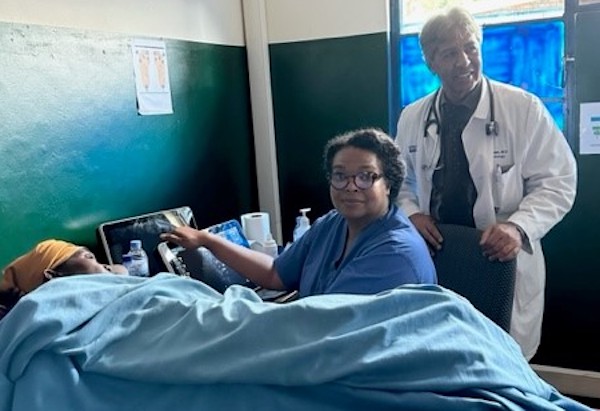
WATCH: Dr. Khalid Sheikh talks about his experiences with Team Heart in Rwanda HERE.
BREVARD COUNTY, FLORIDA – Heart disease in young adults and children is extremely rare here in the United States. However, heart disease caused by rheumatic fever (rheumatic heart disease) is one of the most common forms of heart disease reported in individuals younger than 25 – accounting for nearly 300,000 deaths around the world each year – mostly occurring in developing countries.
One such area hit hard by the disease is the east African country of Rwanda, where simple antibiotics we take for granted here in the U.S. are scarcely available, helping a standard infection like strep throat lead to heart damage and even death.
Health First Cardiologist Khalid Sheikh, MD, has been on dozens of international mission trips over the course of his medical career, and he recently joined Team Heart in Rwanda to help care for dozens stricken by infection and fever-related heart damage.
“My wife and I have had a passion for working in underserved parts of the world and especially delivering cardiac care to places that don’t have access to the cardiac care that we have here in the United States. And our latest was this mission to Central Africa, where there’s a tremendous need for heart care related to the prevalence of a specific type of heart problem in Rwanda,” said Dr. Sheikh.

According to Sheikh, 90% of the people in Rwanda don’t have access to a medical practitioner, and many ultimately develop a heart valve problem that leads to their heart deteriorating. The goal of the mission, Dr. Sheikh said, was to try and identify those children at a point when they could receive surgery and also to work on preventative steps and instruction to stop the development of rheumatic fever.
“If we identify a child that has an advanced valve problem, what we will typically do is take a variety of steps leading up to determining if they’re actually a candidate for surgery – and it all starts with identifying who has symptoms or a heart murmur. That’s the No. 1 way in which a child is identified,” Dr. Sheikh explained.
The advanced valve problem most often results from damage caused by one or several episodes of rheumatic fever, an autoimmune inflammatory reaction to throat infection with group A streptococci (streptococcal pharyngitis or strep throat). It most commonly occurs in childhood and can lead to death or life-long disability. Rheumatic heart disease can be prevented by preventing streptococcal infections or treating them with antibiotics when they do occur.
According to the World Health Organization (WHO), in some people, repeated strep infections cause the immune system to react against the tissues of the body including inflammation and heart valve scarring (rheumatic fever.) Rheumatic heart disease results then from the inflammation and scarring of heart valves caused by rheumatic fever.
Rheumatic fever mostly affects children and adolescents in low- and middle-income countries, especially where poverty is widespread and access to health services is limited. People who live in overcrowded and poor conditions are at greatest risk of developing the disease. Despite being eradicated in many parts of the world, the WHO reports the disease remains prevalent in sub-Saharan Africa, the Middle East, Central and South Asia, and the South Pacific.

“When our team arrives, we bring in advanced diagnostic testing that isn’t available in Rwanda. And the key technique that we use is called echocardiography. So we walk around with these portable echo machines that basically fit in a briefcase. We will do screening echocardiograms on anyone who is a potential candidate, and we’ll typically screen about 50 patients a day in a clinic,” Dr. Sheikh said.
Dr. Sheikh said that part of the goal of Team Heart is not only to provide the local care for their screening and their surgeries but to make it iterative by training local surgeons and cardiologists to take over these jobs when the team leaves.
“We visited seven different rural locations and performed about 400 patient screenings over two weeks. And then the last week was spent working in the main hospital in Kigali where we were able to identify 15 patients who needed heart surgery – and all of those patients were able to receive heart operations,” Dr. Sheikh said.
Such operations typically involve removing the damaged heart valve and putting in a new valve. Most of the manufactured valves are donated by a variety of North American companies that make heart valves. He said that the appreciation and anticipation of care local residents harbor is something he’ll always remember.
“After travelling for hours over very rugged, tough terrain, once we arrive at a village, the patients have been waiting there since 4 a.m. for us. And there’s a line of typically 50 to 60 people that are already there. And many of these patients have walked 25 miles over two or three days just to see us. And so that makes our efforts as volunteers a minuscule hardship compared to what these people are there to receive.”
WATCH: Dr. Khalid Sheikh talks about his experiences with Team Heart in Rwanda HERE.
For all the latest news, visit HF.org/news.
The post Mission Rwanda: Health First Cardiologist Dr. Khalid Sheikh Leads Life-Saving Team in Africa appeared first on Space Coast Daily.
